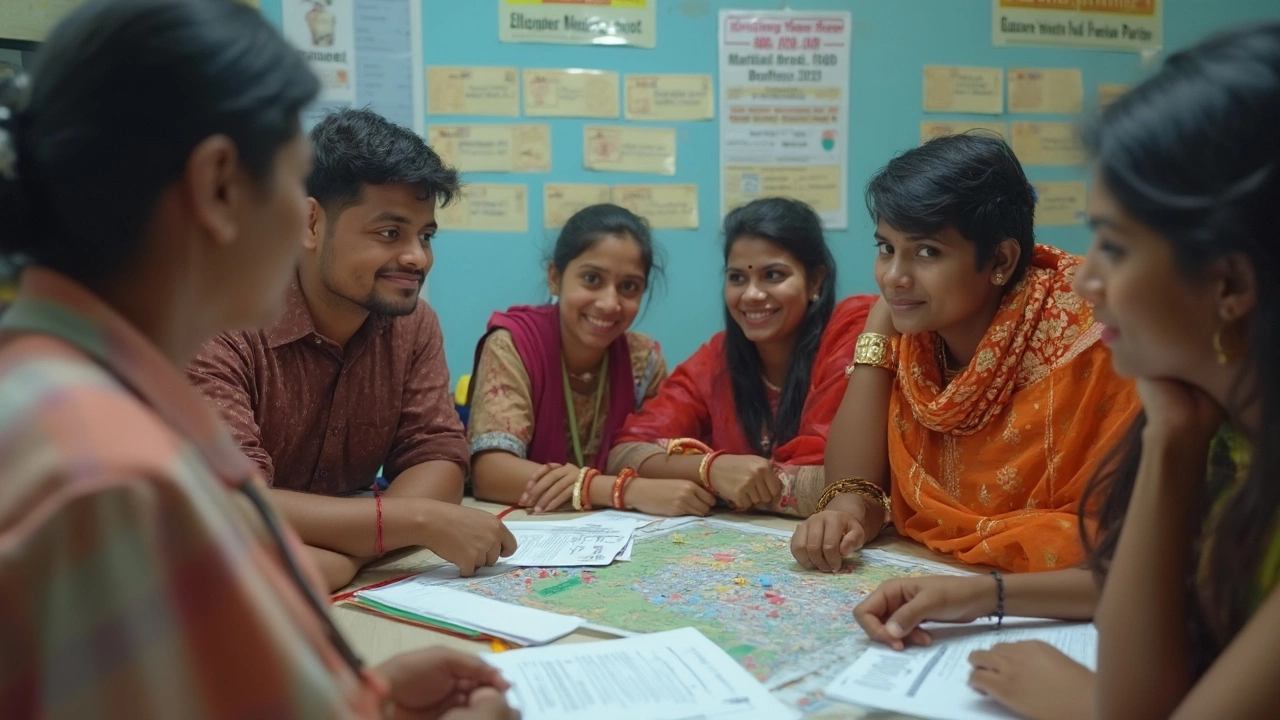
Ever wish you could actually help change stuff in your town? Volunteering for local government is a straight-up way to make that happen—no fancy degree or connections needed. And yes, you really can start as a volunteer, whether you're a student, a retiree, or just someone who wants to get on the inside track for a government job later.
Real-talk: cities, towns, and districts are always looking for extra hands. They rely on regular people to pitch in for everything from library support to community events, disaster prep, and board committees. A lot of these jobs don’t even show up on the usual job sites—they’re shared on local government websites, public notice boards, or even through word of mouth.
- Why Local Governments Want Volunteers
- Types of Volunteer Roles Available
- How to Find and Apply for Volunteer Openings
- Skills You Gain and Career Boosts
- Common Surprises and What to Watch Out For
Why Local Governments Want Volunteers
Here’s the real deal: local government budgets are usually tight. They have a lot more work than their paid staff can handle. When you step up to volunteer, you plug those gaps, so neighborhoods run smoother, events actually happen, and basic services stay on track. Without volunteers, a lot of community projects would seriously stall or never get off the ground at all.
Volunteers don’t just save money—they bring fresh energy and local knowledge that you can’t fake. For example, if a city is running a summer camp or park clean-up, volunteers often know what the community actually needs because they live right there. This can make projects way more effective instead of just ticking off boxes for funding.
Some towns rely so heavily on volunteer help that entire festivals, safety committees, and even things like animal shelters wouldn’t run without them. Take municipal libraries—nearly 70% in small towns reported that regular volunteers are key just to keep their doors open, according to a 2023 survey by the Urban Libraries Council.
But besides day-to-day support, volunteers allow local governments to try out new stuff without blowing the whole budget. Want a new youth sports league, tech event, or fire drill program? Volunteers make it doable and cut the risk if something flops.
- Extra hands for big events, so paid staff aren’t stretched thin
- Unique skills, like speaking a language, running social media, or knowing how to repair things
- Stronger community trust when real residents get involved
Volunteering is a win-win. Local government gets stuff done. Volunteers get experience—and sometimes inside info about upcoming government jobs openings. People who help out often get the first heads-up about staff roles, internships, or special projects. If you want to get your foot in the door, this is almost like a shortcut.
Types of Volunteer Roles Available
People often think volunteering for local government means just picking up trash or helping at big events. But there’s actually way more to it. Local governments like city halls, county offices, and even local boards offer a big menu of volunteering jobs. The cool part? Some of these roles put you right at the table with decision-makers.
Here are some solid examples of roles you might find:
- Library Assistant – Tidy up shelves, help run story hours, or sort books at your community library.
- Planning Commission Helper – Take notes at meetings, do basic research, or help prep for public hearings about things like roads and new buildings.
- Community Event Crew – Help plan or set up town parades, food festivals, public sports events, or voting centers.
- Park Volunteer – Assist rangers, plant trees, repair playground gear, or clear hiking trails in city parks or nature preserves.
- Animal Shelter Assistant – Walk dogs, feed cats, or pitch in at adoption days for local animal control or shelters tied to the town or city.
- Disaster Prep and Emergency Response – Stuff emergency kits, help with drills, pass out info or support first response teams during major storms or local crises.
Some local governments even take volunteers for board or advisory committees. For example, you can give feedback on neighborhood planning, school safety, or public transportation. Sometimes you don’t even need to be a local resident; students or professionals living nearby can pitch in too.
Check out this quick snapshot of the most common roles folks volunteer for:
| Volunteer Role | Common Department | Minimum Age |
|---|---|---|
| Library Assistant | Public Library | 16 |
| Event Support | Parks & Recreation | 14 |
| Board Committee Member | Various (Planning, Housing, etc.) | 18 |
| Disaster Aid Helper | Public Safety | 18 |
| Park Volunteer | Parks & Recreation | All ages (with parent/guardian if under 16) |
The mix of opportunities is wide, and almost all of them count as genuine experience you can add to your resume if you’re prepping for a government job. Plus, some agencies even offer basic training or shadowing so you don’t have to fake it till you make it.

How to Find and Apply for Volunteer Openings
So, you want to volunteer for local government. Awesome. The first step is actually knowing where these opportunities are hiding. And yeah, they can be tucked away if you don’t know where to look.
Most city and town websites have a “Get Involved” or “Volunteer” page—Google your city’s name plus “volunteer” and see what pops up. Smaller towns sometimes just post flyers in libraries, community centers, or even supermarkets. Don’t overlook Facebook groups run by local government offices—these channels are way more active than most folks think.
Some useful places to check for volunteer gigs:
- Official local government websites
- Public libraries’ bulletin boards
- City hall or municipal offices
- Local parks and recreation departments
- Community-specific Facebook or WhatsApp groups
Don’t expect long applications. A lot of the time, you’ll just need to fill out a quick online form or send an email (sometimes, your social media message will do). You might be asked to list your basic info, interests, and any skills, like if you speak another language or have first-aid training. For certain roles, like working with kids, there’s usually a background check—standard stuff, just be ready for it.
If you’re eyeing something bigger—like a place on a city advisory board—you might need to submit a resume and attend a short interview. The hiring pace is slow compared to private jobs, so don’t stress if it takes weeks to hear back. Showing you’re really interested can go a long way: follow up after a week, or even call the office to make your case. Most departments are happy to answer questions and give you tips to boost your chances.
| Step | Description |
|---|---|
| Search | Check city website, public boards, social media |
| Apply | Fill form or email contact listed |
| Background Check | Needed for sensitive roles (kids, finance, etc.) |
| Follow Up | Politely check your application progress |
Don’t get hung up waiting for the perfect role to show. Get in where you can—most people switch roles after a few months, once they know the ropes and meet new people. This puts you on the radar for bigger, more interesting gigs the city needs to fill later on.
Skills You Gain and Career Boosts
Volunteering for local government isn't just about giving back—it's honestly one of the smartest hacking moves for building job-ready skills and stacking up your public service street cred. People who spend time as local government volunteers end up way ahead in both hard and soft skills. Here’s what you can actually expect to pick up:
- Project management: Whether you help organize a community clean-up or support local elections, you'll learn to juggle deadlines and work with real budgets.
- Communication: Expect to give updates, send emails, talk to teams, and sometimes even speak at public events. All this builds confidence fast.
- Teamwork: You’ll work with people of all ages and backgrounds, which prepares you for almost any job environment later. If you want a real example, check out how city youth councils mix high schoolers with adult leaders on real projects.
- Problem-solving: Local government work is packed with weird, real-world problems. For example, you might help re-route an event due to rain or support a voter drive that gets hit with tech troubles. Every solved problem is something hiring managers love to see.
- Understanding bureaucracy: This one sounds boring but it’s gold. You figure out how decisions really get made, and how to get things done the official way—huge for anyone prepping for a government job.
But that’s not all—it can really pay off long-term. Data from the National Council on Volunteerism shows over 35% of full-time public sector employees said their first government role was actually a volunteer position. That means your "unpaid" hours could boost your shot at a paid role down the line—most local governments love to hire from within their own volunteer pools.
| Skill Gained | How It Helps Your Career |
|---|---|
| Leadership experience | Helps you move into supervisor or team lead positions faster |
| Networking | Puts you on the radar for early job openings and mentorships |
| Government process insight | Preps you for civil service exams and interviews with real behind-the-scenes knowledge |
If you’re prepping for government jobs later, these skills and connections stay with you. Plus, they look gold on a resume—way better than just "hardworker" or "team player." If you spot an opening to volunteer, grab it. You’ll build more than just work experience—you’re creating a shortcut into the world of public service.

Common Surprises and What to Watch Out For
If you’ve only seen local government from the outside, you’re in for some curveballs once you start volunteering. Here’s what usually catches people off guard.
Meetings can drag on. You might expect crisp, action-packed sessions, but sometimes there’s an unnecessary amount of talking before any decisions. Not every issue gets resolved neatly—some debates just get kicked to the next month.
Flexibility goes both ways. You often get to set your own schedule, but sometimes events or projects pop up last-minute. If you’re hoping for a set-in-stone routine, that’s not always guaranteed.
Background checks are almost always required, even for unpaid gigs. This can slow down your start, especially if you’re itching to get involved next week. Don’t be surprised if you’re asked for references or a police clearance certificate—local governments take this seriously.
If you’re expecting political drama, most of the time you’ll just see regular folks doing their best to help out. But yes, disagreements happen. You may have to work with people whose ideas are poles apart from yours. It helps to know how to disagree politely and focus on the work.
- Some tasks feel a bit repetitive, like putting together packets or tallying survey results.
- Lingo can be confusing—expect terms like “quorum,” “agenda packet,” or “sunshine law” to get thrown around. Ask when you don’t know something. People are usually happy to explain.
- Progress might be slow, especially on bigger projects that need approvals or funding.
On the plus side, you’d be surprised at the trust you get. Some local agencies rely on volunteers for really important stuff, like running polling stations or helping with safety checks during events. You get to see the inner workings up close, and that’s worth way more than just padding your resume for government jobs.
| Surprise | Reality |
|---|---|
| Instant impact | Change takes time, especially with regulations |
| Just coffee runs | Real responsibility—sometimes you’re in charge |
| No politics | Occasional disagreements and different agendas |
If you stick with it, you’ll learn the ropes fast and become a go-to person. Just stay open, ask questions, and say yes to chances—especially when they’re a little out of your comfort zone. That’s how you score both cool experiences and valuable contacts in public service.
